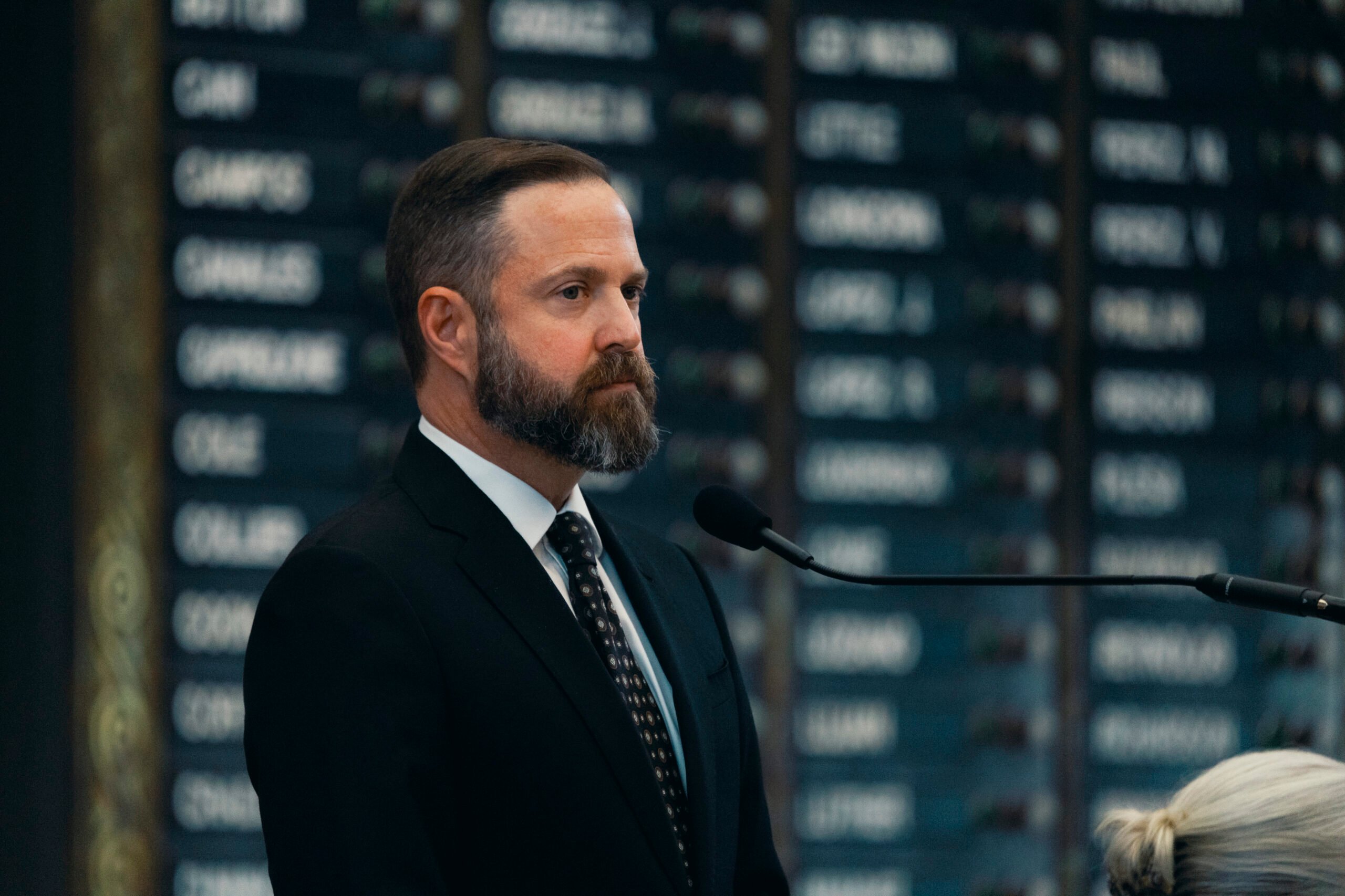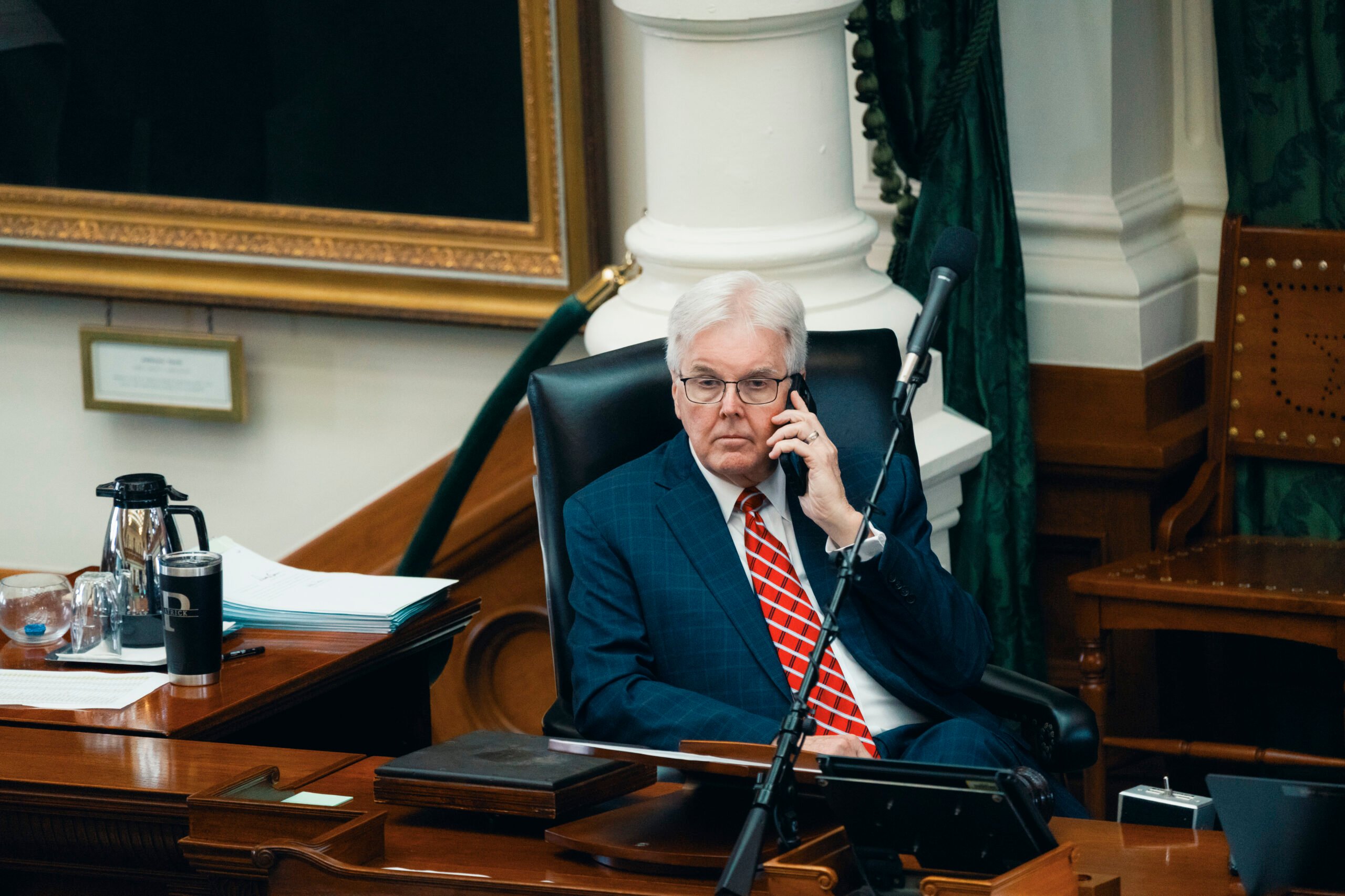News from the South - Texas News Feed
Gene Wu on the Trials of the 89th Texas Legislature
The job of leading the minority party in the Texas House has long consisted, at best, of harm reduction and something like emergency room triage. At worst, it amounts to frantically herding several dozen cats—many of whom can be coaxed out of their homes by the GOP House speaker’s saucers of warm milk.
Since 2009, Dems have largely wielded their collective power to elevate their preferred Republican to the House speakership as a means to minimize damage and maximize some semblance of influence. That was once again the case in the 89th legislative session—though the net worth of that strategy seems to be ever diminishing.
Amid a barefisted Republican brawl for the speaker’s gavel, Democrats helped elect Lubbock state Representative Dustin Burrows as the leader of the lower chamber, going into a monumental session centered around the governor’s push for private school vouchers. Along with a new speaker, there were hordes of newly elected hardline conservatives entering the 150-member House who were eager to upend the establishment and push the agenda of the far right.
There was also a new chair of the House Democratic caucus—a 60-some-member body that’s been slowly shrinking since 2018—in state Representative Gene Wu, an outspoken Houston liberal. Since first coming to the House in 2013, Wu has established a reputation as a passionate defender of immigrant communities and against xenophobia targeting Asian Americans—and as an exuberant social media poster (sometimes to his own detriment).
Wu was a late entrant in the caucus chair race to challenge San Antonio’s Trey Martinez Fischer, who had served just one term in the role. Wu cited the need, among other things, for better “external communication.” The caucus ultimately threw its support behind Wu over Martinez Fischer and Dallas Democrat John Bryant.
The Republican-led outcomes of this session were, once again, rather devastating. And with sine die now in the rearview, the perennial question arises: How much of this was inevitable? How much worse would it have been if not for Democrats’ efforts, or how much better could it have gone with better strategy and execution?
The Texas Observer spoke with Wu last Wednesday about the Burrows speakership, the challenges of wrangling Democrats, and the politics of property taxes.
TO: With all of the new members that came in this session—the new speaker, the new rules—what were the key differences you saw in terms of how the House itself operated?
I think the easiest observation is that the Senate ran roughshod over the House. The first time in my memory, in my experience, that that’s happened. The Senate got everything that it wanted down to the last detail, and then the House pretty much got nothing that it asked for.
Why do you think that was?
I think it’s a combination of Republican political dynamics. The fact that we did have so many not only new members but so much of the leadership were juniors and sophomores. So fundamentally, I don’t think that the House on the Republican side was prepared to operate in the environment that’s normally here. And that is: It’s not necessarily D versus R. It’s often House versus Senate at the end.

And [Lieutenant Governor Dan] Patrick was able to exploit that?
I think Patrick and his lieutenants, who are very, very senior political hands, took full advantage of this and basically did whatever the hell they wanted.
What were your expectations coming in as the new caucus chair?
I think I knew that going into this, the vast majority of our time would be to just help defend Texas against the very worst of Republican inclinations, their worst political motivations. To just find ways to help stop those things.
How would you grade the performance of Democrats in terms of meeting that goal?
In terms of actual results, probably like a B, B-minus. I mean, there’s just only so much we can do in terms of actual results, actual ability to stop these things. We can only play the hand that we’re dealt and what we were dealt was a hand where the public took two seats away from us [in the 2024 elections]. And we had to accomplish basically everything that we’ve accomplished in the past cycles, but with less power.
But I think we’ve accomplished that. I think we did the best we could. I’m not embarrassed about our efforts.
In terms of like, what were we actually able to stop? We stopped some, but a lot of stuff got through, in terms of vouchers, in terms of banning THC, in terms of insufficient school funding. … I think Democrats tried their best. But, not only are we looking at being politically hobbled by the last election, but we have the full might of not only the Texas Republican Party, the Republican leadership, but also the White House. How many times in our history has the White House made a phone call or made demands on our body?
On that phone call from President Donald Trump on the day of the voucher vote where there was the push to pass an amendment to put it on the ballot, do you think that phone call legitimately did turn Republicans?
Yes. There’s no doubt of it. We watched that front collapse in real time.
One of the first moves by much of the caucus was to decide to get behind Dustin Burrows in this open speaker fight. Looking back on that, do you think that was the correct strategy ?
Yes, of course. Tell me what the other sensible strategy was. There were only three pathways, three possible pathways. The pathway that ended with a Democratic Speaker of the House was unlikely, unviable, and irrational. There’s no numbers, no reality where that works. The other pathway was, choose somebody who has promised to be even worse and who was allied with the worst actors. And with Burrows, at least his allies were people who were at least tolerable to us.
So, given even how things turned out, knowing what I know today, would I have made a different choice? I’m not sure that I could have made a different choice. What other choices were there?
Do you think Democrats could have stood united in withholding support for longer in order to try to secure actual concessions?
Is it possible? Of course. Anything’s possible. I could suddenly turn into a fish. It’s within the realm of possibility.
How difficult is it to keep the caucus united, and to prevent the speaker from being able to kind of pick apart Democrats?
I think that holding the group together was probably the single greatest challenge of being chair because our caucus is made up of such incredibly diverse areas. Everyone has different interests and whether their interests have to do with their region or they have to deal with their personal legislation, it was a struggle to keep everyone on the same page.
It’s hard to make sure that everyone cares—that everyone fights against the anti-immigrant bills as far as they fight against the anti-LGBTQ bills as far as they fight against the anti-women bills. So we want to make sure that our coalition was united for those kind of fights. And for the most part, they were. Although, you know, there were some notable defections.
Do you think Speaker Burrows acted in good faith in how he dealt with Democrats through the session?
I will refrain from giving my personal account, because I think some of the stuff that was promised to me, that’s different. But I think the overall feeling from the membership is that many promises were not kept. And I’m not saying that as like, promises were broken to me, but I think the overall consensus of the membership is that many, many deals were not kept.
Can you give an example or two of specific promises?
I will not. I will not.
Speaker Burrows—better or worse than Speaker Dade Phelan?
There’s no way to judge accurately because the situation is completely different. This is an immensely different body. The political situation is different. You might as well say, “Better or worse than Joe Straus?” Well, Joe Straus operated in very different times. I’m not trying to nitpick that question I’m just saying that’s not a fair question to ask in the abstract.
The new House rules banned the longtime practice of appointing Democrats to some committee chairmanships. The compromise was to then make Democrats vice chairs of every committee. Did this new system provide meaningful influence?
Somewhat. You know, if you’re trying to ask me, is having a whole bunch of vice chairs of relevant committees better or worse than having a few chairs of irrelevant committees—is that better or worse? I would say, on the whole, having the vice chair position is better. Because we get money for staff. There’s at least the threat of, “Hey, I’m going to go tell the speaker you’re not being nice.” There’s at least some ability to do that.
In the last primary, Governor Greg Abbott infamously pumped tens of millions of dollars into state House races to elect allied lawmakers and oust Republican incumbents who were opposed on the issue of vouchers. What was your sense on the House floor of how much his influence loomed over or permeated the session?
I don’t think people were scared of Abbott as much as they were scared of Trump. … In this day and age, saying that legislation is something that Governor Abbott wants is a dangerous proposition.
Because that might actually spark a backlash and have the opposite effect?
Correct. Even among Republicans.
On vouchers and school finance, the speaker’s strategy was branded as the two-step. The House passed vouchers and school funding together in mid-April. The Senate quickly signed off on the voucher bill, and then the school finance bill, Dan Patrick just took control of it and seemingly used that to extract a whole lot of changes. Was that Burrows getting rolled?
I don’t know if Burrows personally got rolled on it, but the House got rolled. So, however you want to parse that.
On the debate over property taxes and providing property tax cuts, I think the primary policy debate was between the House and the Senate, between Patrick’s preference and the House’s preference. What I didn’t see was Democrats putting forward their own policy plan on that specific issue. Isn’t that something that House Democrats should be doing?
We should. I mean literally half [Republicans’] plans that pass are the Democratic plans. Democrats were the ones pushing for the homestead exemption increase for decades, and it was the Republicans who were opposed to it. And all of a sudden Republicans decide, “Oh, this is the way to do it. This is what everyone loves…”
I think there’s a certain point where Democrats are almost like, what does it matter? Any idea that Democrats would put forward is automatically killed. Because it’s not about solving the problem. They want to run on the issue and consistently do that.
You know what’s gonna fix property taxes? It’s not property taxes. What’s going to fix property tax is school finance reform—proper school finance reform. Because what is the bulk of property taxes? It’s education. What’s the next big part? It’s law enforcement, it’s healthcare, it’s the hospital districts. You can’t deal with property taxes until you address those items, until the state comes in and says, we’re going to properly fund all those items so that we’re not reliant on local property taxes for those services.
This always is my big rant on the front mic: Every time we pass another constitutional amendment to ban this kind of tax and that, that just puts more pressure onto the two remaining taxes that we have—sales tax and property taxes.
I don’t understand how we’re this dumb about this. How are people who are supposed to be the best and brightest of our communities this stupid on how taxes work? It’s mind-blowing.
The Republicans’ constitutional amendment resolutions [which require 100 House votes] that would ban any future possibility of a tax on securities or financial transactions, a tax on capital gains, and so forth—those all pass with enough Democratic votes to get over the line. Why?
One, because I don’t think people knew any better. We tried to tell our membership that these are not ideas that should have the time of day … that every time we do this, we lock up another tax system [and] that’s another thing that’s going to get pushed onto property taxes.
But also at the same time, [House leadership] exerted a lot of pressure on members, who may not have cared one way or the other about this issue, but they said, “Hey, if you don’t vote for this, then we’re not going to pass your bills.” It’s not a hard thing to tell people, especially on something that they may not even just care about all that much. Obviously I have a strong philosophical opposition to this type of thing, but you have members who don’t have a strong feeling about it. … They don’t understand what it means. You ask most members what capital gains are, they’re like, “Umm something about taxes?”

What do you think is the most important thing that did—or didn’t—get passed this session that may have been overlooked?
I mean, Democrats were able to stop a lot of really bad stuff. We kept a lot of really terrible stuff bottled up in committee. We were able to kill a lot of stuff on points of orders on the floor. We were even able to kill the second “death star” bill [to further preempt local government authorities]. We basically neutered the personal injury bill [pushed by Texans for Lawsuit Reform], and it ended up not passing at all. That was at least some relief for people, the average working-class Texans. You know, the school finance bill did get passed. … It’s not enough, but it’s something. Something’s better than nothing.
Looking to the 2026 midterms, are you optimistic about Democrats’ chances of making gains in the Legislature or in the statewide races?
I don’t know how to answer a question about optimism. Because what’s driving us is not optimism. What’s driving me is rage. What is driving me is talking to all the Texans, on both the left and the right, who are just mad about what their life is. They’re mad that politicians keep talking about fixing things and they never do. They’re mad they think the American dream has been snatched from them. They’re mad that people constantly work themselves to death for no result, for no forward progress. That’s not going away. That’s not a Democrat versus Republican issue. That is an American people issue.
What my intention is, is to give voice to that rage. Give voice to both the people on the left and on the right. And we’re going to make sure that they know that if they want to do something about it, they can join us. We can get past the nanny-state red-meat issues that steal people’s rights and steal people’s freedoms. Once we get past those, we can talk about the real issues—about why we’re not moving forward, why life has to be so hard for Americans—and I think that’s what’s going to drive the next cycle.
This interview has been edited for length and clarity.
The post Gene Wu on the Trials of the 89th Texas Legislature appeared first on www.texasobserver.org
Note: The following A.I. based commentary is not part of the original article, reproduced above, but is offered in the hopes that it will promote greater media literacy and critical thinking, by making any potential bias more visible to the reader –Staff Editor.
Political Bias Rating: Center-Left
The content is presented from the perspective of a Democratic caucus chair in the Texas House, focusing on the challenges faced by Democrats in a GOP-dominated legislature. It highlights Democratic efforts to mitigate conservative policies, criticizes Republican leadership and tactics, and addresses issues such as public school funding, vouchers, and tax policy from a viewpoint sympathetic to progressive causes. The tone is critical of the Republican majority’s influence and policies, while emphasizing Democratic resistance and concerns for social justice and equity, indicating a center-left political leaning. The piece acknowledges practical political limitations and strategic considerations rather than expressing far-left rhetoric.
News from the South - Texas News Feed
Frustrated with poor play against UTEP, Arch Manning will 'get back to basics'
SUMMARY: Texas quarterback Arch Manning and coach Steve Sarkisian acknowledge the team’s underwhelming offensive performance in a 27-10 win over UTEP. Manning completed 11 of 25 passes for 114 yards with a touchdown and an interception, frustrating fans expecting a stronger showing at home. Despite a rough first half with 10 consecutive incompletions, Manning showed flashes of promise and scored twice on the ground. Sarkisian emphasized Manning’s mental struggle rather than physical injury and expressed confidence in his growth and consistency. Manning committed to improving fundamentals and handling in-game pressure ahead of tougher matchups, including their SEC opener against Florida on Oct. 4.
The post Frustrated with poor play against UTEP, Arch Manning will 'get back to basics' appeared first on www.kxan.com
News from the South - Texas News Feed
Austin becoming FEMA-approved emergency alert authority, planning 1st test alert
SUMMARY: On Monday, Sept. 29, Austin will conduct a test of the Integrated Public Alert and Warning System (IPAWS), becoming a FEMA-approved alerting authority able to send emergency alerts via Wireless Emergency Alerts (WEA) to cell phones and Emergency Alert System (EAS) messages to TV and radio. This coordinated test at 3 p.m. will cover the city across its three counties—Travis, Hays, and Williamson. The alerts will clearly indicate a test and require no action. IPAWS allows authenticated, geotargeted emergency notifications without subscription, enhancing public safety communication. More details are available at ReadyCentralTexas.org and Ready.gov/alerts.
The post Austin becoming FEMA-approved emergency alert authority, planning 1st test alert appeared first on www.kxan.com
News from the South - Texas News Feed
La Niña now expected to last all winter
SUMMARY: For the first time this year, La Niña is now forecast to last throughout the entire winter, with NOAA’s Climate Prediction Center giving it a 54% chance for December-February. Previously, ENSO Neutral was favored for winter. La Niña occurs when sea surface temperatures in the eastern equatorial Pacific are 0.5ºC below average, typically pushing the Pacific Jet Stream north, causing drier, warmer conditions in the southern U.S. and wetter areas in the Pacific Northwest. Last winter, a weak La Niña brought a record warm December but cooler January-February, below-average rainfall, snow in Austin, and more freezes than normal. Another mild La Niña winter is expected for Central Texas.
The post La Niña now expected to last all winter appeared first on www.kxan.com
-
News from the South - Missouri News Feed7 days ago
1587 Prime gives first look at food, cocktail menu ahead of grand opening in KC
-
News from the South - West Virginia News Feed7 days ago
Protesters in D.C. flood the streets demanding an end to Trump’s military deployment
-
Mississippi News Video7 days ago
Interview: Come see Baptist at WTVA Senior Health Fair
-
News from the South - Arkansas News Feed6 days ago
‘One Pill Can Kill’ program aims to reduce opioid drug overdose
-
News from the South - Alabama News Feed6 days ago
Alabama lawmaker revives bill to allow chaplains in public schools
-
The Conversation7 days ago
How is paint made?
-
News from the South - Arkansas News Feed6 days ago
Arkansas’s morning headlines | Sept. 9, 2025
-
News from the South - Missouri News Feed6 days ago
Pulaski County town faces scrutiny after fatal overdose










































